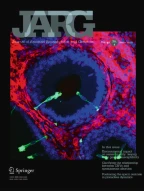Abstract
Purpose
Embryo testing to improve pregnancy outcomes among individuals who are seeking assisted reproduction technologies is increasing. The purpose of this study was to assess decisional factors through in-depth interviews for why women would accept or decline preimplantation genetic testing for aneuploidy (PGT-A) with in vitro fertilization (IVF).
Methods
Semi-structured telephone interviews were conducted with 37 women who were offered PGT-A with IVF during the summer 2017. Interviews lasted on average 40 min and were audio-recorded, transcribed, and analyzed using a content analysis.
Results
Results identified a number of decisional factors related to values about conception, disability, and pregnancy termination, past pregnancy experiences, optimism toward technology, and cost. Other key issues that were identified include the use of expanded carrier screening prior to IVF, maternal age, and limited education about PGT-A due to the complexity about education for IVF alone.
Conclusion
There is a need to develop decision support tools for the increasing choices of genetic testing options for patients seeking IVF. Including patients’ values, past pregnancy experiences and attitudes toward science into the decision-making process may help promote a more informed decision.
Similar content being viewed by others
References
Rubio C, Rodrigo L, Mir P, Mateu E, Peinado V, Milán M, et al. Use of array comparative genomic hybridization (array-CGH) for embryo assessment: clinical results. Fertil Steril. 2013;99(4):1044–8.
Fragouli E, Wells D, Whalley KM, Mills JA, Faed MJW, Delhanty JDA. Increased susceptibility to maternal aneuploidy demonstrated by comparative genomic hybridization analysis of human MII oocytes and first polar bodies. Cytogenet Genome Res. 2006;114(1):30–8.
Bielanska M, Tan SL, Ao A. High rate of mixoploidy among human blastocysts cultured in vitro. Fertil Steril. 2002;78(6):1248–53.
Dahdouh EM, Balayla J, Audibert F, Genetics Committee, Wilson RD, Audibert F, et al. Technical Update: Preimplantation Genetic Diagnosis and Screening. J Obstet Gynaecol Can. 2015;37(5):451–63.
Scott RT Jr, Ferry K, Su J, Tao X, Scott K, Treff NR. Comprehensive chromosome screening is highly predictive of the reproductive potential of human embryos: a prospective, blinded, nonselection study. Fertil Steril. 2012;97(4):870–5.
Brezina PR, et al. Evaluation of 571 <em>in vitro</em> fertilization (IVF) Cycels and 4,873 embryos using 23-chromosome single nucleotide polymorphism (SNP) microarray preimplantation genetic screening (PGS). Fertil Steril. 2012;97(3):S23–4.
Forman EJ, Tao X, Ferry KM, Taylor D, Treff NR, Scott RT. Single embryo transfer with comprehensive chromosome screening results in improved ongoing pregnancy rates and decreased miscarriage rates. Hum Reprod. 2012;27(4):1217–22.
Besser AG, Mounts EL. Counselling considerations for chromosomal mosaicism detected by preimplantation genetic screening. Reprod BioMed Online. 2017;34(4):369–74.
Penzias A et al. The use of preimplantation genetic testing for aneuploidy (PGT-A): a committee opinion. Fertil Steril. 2018;109(3):429–436. https://doi.org/10.1016/j.fertnstert.2018.01.002.
Harper JC, Wilton L, Traeger-Synodinos J, Goossens V, Moutou C, SenGupta SB, et al. The ESHRE PGD consortium: 10 years of data collection. Hum Reprod Update. 2012;18(3):234–47.
Brezina PR, Ke RW, Kutteh WH. Preimplantation genetic screening: a practical guide. Clin Med Insights Reprod Health. 2013;7:37–42.
McGowan ML, Burant CJ, Moran R, Farrell R. Patient education and informed consent for preimplantation genetic diagnosis: health literacy for genetics and assisted reproductive technology. Genet Med. 2009;11(9):640–5.
Brezina PR, Kutteh WH, Bailey AP, Ke RW. Preimplantation genetic screening (PGS) is an excellent tool, but not perfect: a guide to counseling patients considering PGS. Fertil Steril. 2016;105(1):49–50.
Committee, E.P.C.S. ESHRE preimplantation genetic diagnosis consortium: data collection III (may 2001). Hum Reprod. 2002;17(1):233–46.
Gebhart MB, Hines RS, Penman A, Holland AC. How do patient perceived determinants influence the decision-making process to accept or decline preimplantation genetic screening? Fertil Steril. 2016;105(1):188–93.
Chang J, Boulet SL, Jeng G, Flowers L, Kissin DM. Outcomes of in vitro fertilization with preimplantation genetic diagnosis: an analysis of the United States assisted reproductive technology surveillance data, 2011–2012. Fertil Steril. 2016;105(2):394–400.
Genoff Garzon MC, Rubin LR, Lobel M, Stelling J, Pastore LM. Review of Patient Decision-Making Factors and Attitudes Regarding Preimplantation Genetic Diagnosis. Clin Genet. 2017; https://doi.org/10.1111/cge.13174.
Dedoose. Dedoose Version 7.0.23: Web application for managing, analyzing, and presenting qualitative and misxed method reearch data. Los Angelos: SocioCultural research Consutlants, LLC; 2016.
Miles M, Huberman AM, Saldana J. Qualitative data analysis: A methods sourcebook. 3rd ed. Los Angeles: Sage; 2014.
Rothwell, E., et al. Experiences among women with positive prenatal expanded carrier screening results. J Genet Couns, 2016.
Hershberger PE, Gallo AM, Kavanaugh K, Olshansky E, Schwartz A, Tur-Kaspa I. The decision-making process of genetically at-risk couples considering preimplantation genetic diagnosis: Initial findings from a grounded theory study. Soc Sci Med. 2012;74(10):1536–1543.https://doi.org/10.1016/j.socscimed.2012.02.003.
Practice Committee of Society for Assisted Reproductive Technology, Practice Committee of American Society for Reproductive Medicine. Preimplantation genetic testing: a practice committee opinion. Fertil Steril. 2008;90(5 Suppl):S136–43. https://doi.org/10.1016/j.fertnstert.2008.08.062.
Ying L, Wu LH, Loke AY. The effects of psychosocial interventions on the mental health, pregnancy rates, and marital function of infertile couples undergoing in vitro fertilization: a systematic review. J Assist Reprod Genet. 2016;33(6):689–701. https://doi.org/10.1007/s10815-016-0690-8.
Garrett N, Sharot T. Optimistic update bias holds firm: three tests of robustness following Shah et al. Conscious Cogn. 2017;50:12–22.
Stacey, D., et al. Decision aids for people facing health treatment or screening decisions. In Cochrane Database Syst Rev. 2011.
Collins SC, Xu X, Mak W. Cost-effectiveness of preimplantation genetic screening for women older than 37 undergoing in vitro fertilization. J Assist Reprod Genet. 2017;34:1515. https://doi.org/10.1007/s10815-017-1001-8.
Acknowledgements
The authors would like to thank the University of Utah Graduate Program in Genetic Counseling and the Creative Research Grant program for their support for this research. We would like to thank the Utah Center in Excellence in Ethical, Legal and Social Implications (HG009037) and the Center for Clinical and Translational Science program (1UL1TR001067) for their partial support.
Author information
Authors and Affiliations
Corresponding author
Ethics declarations
Conflict of interest
The authors declare that they have no conflict of interest.
Rights and permissions
About this article
Cite this article
Lamb, B., Johnson, E., Francis, L. et al. Pre-implantation genetic testing: decisional factors to accept or decline among in vitro fertilization patients. J Assist Reprod Genet 35, 1605–1612 (2018). https://doi.org/10.1007/s10815-018-1278-2
Received:
Accepted:
Published:
Issue Date:
DOI: https://doi.org/10.1007/s10815-018-1278-2
